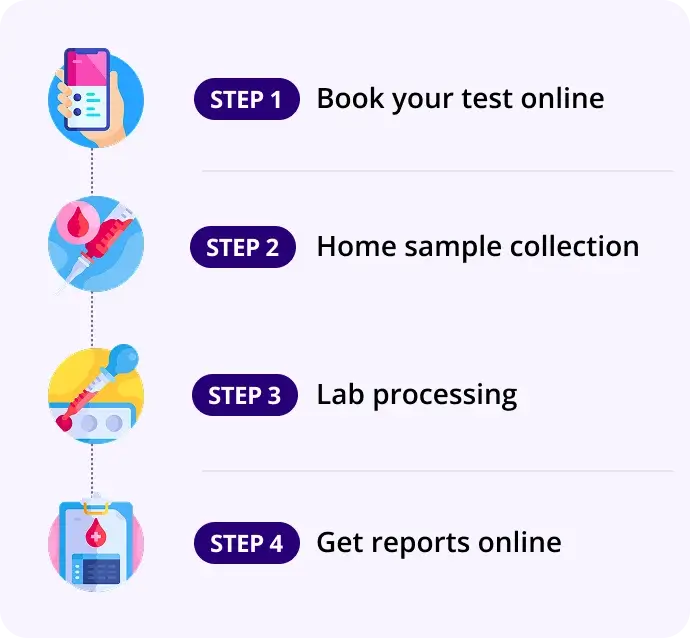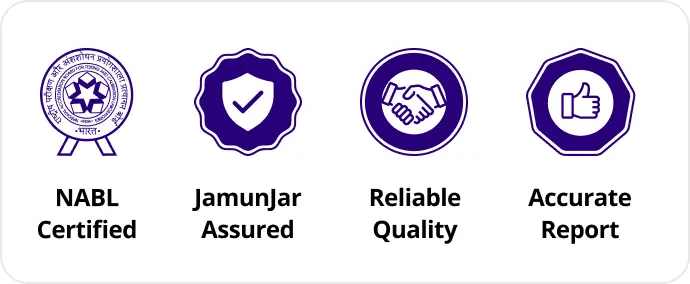Search for
Free Triiodothyronine (FT3)
Thyroid
Report in 4Hrs
At Home
No Fasting Required
Details
Evaluates Free T3 (Triiodothyronine), the active thyroid hormone affecting metabolism.
₹99₹275
64% OFF
FREE:
Ai Insights
Free Triiodothyronine (FT3) Test Information Guide
- Why is it done?
- Measures the unbound (free) triiodothyronine hormone circulating in the bloodstream, which is the biologically active form of thyroid hormone responsible for metabolic regulation
- Diagnose hyperthyroidism and differentiate between various forms of thyroid dysfunction
- Evaluate symptoms such as rapid heartbeat, tremors, anxiety, weight loss, and heat intolerance
- Monitor treatment effectiveness in patients with thyroid disorders, particularly hyperthyroidism and thyrotoxicosis
- Assess T3 syndrome or T3 toxicosis where FT3 levels are disproportionately elevated relative to free T4
- Part of comprehensive thyroid panel when TSH levels are abnormal or thyroid dysfunction is suspected
- Normal Range
- Reference Range: 2.4 - 4.2 pg/mL (picograms per milliliter) or 3.7 - 6.5 pmol/L (picomoles per liter)
- Note: Reference ranges may vary slightly between laboratories depending on their specific assay methods and population standards
- Normal Result: Indicates adequate thyroid hormone levels and normal metabolic function; thyroid is functioning properly
- Elevated (High) FT3: Greater than 4.2 pg/mL; suggests hyperthyroidism or thyroid dysfunction causing excessive hormone production
- Low (Decreased) FT3: Less than 2.4 pg/mL; may indicate hypothyroidism, severe illness, or impaired peripheral conversion of T4 to T3
- Interpretation
- High FT3 Levels: May indicate Graves' disease, toxic nodular goiter, thyroiditis, thyroid cancer, or excessive thyroid hormone replacement therapy; can cause symptoms of hypermetabolism including tachycardia, palpitations, tremors, anxiety, insomnia, weight loss, and heat intolerance
- Low FT3 Levels: May result from primary hypothyroidism, secondary/central hypothyroidism, sick euthyroid syndrome, severe systemic illness, malnutrition, or medications; manifests as fatigue, weight gain, cold intolerance, bradycardia, constipation, and depression
- T3 Toxicosis: Elevated FT3 with normal or low FT4 and suppressed TSH; early presentation of Graves' disease or selective thyroid hormone overproduction
- In Context of TSH and FT4: FT3 must be interpreted alongside TSH and FT4 levels for accurate diagnosis; pattern of all three values determines clinical significance
- Factors Affecting Results: Medications (beta-blockers, amiodarone, propranolol, glucocorticoids), acute illness, stress, iodine intake, pregnancy, estrogen therapy, liver disease, kidney disease, and recent contrast dye administration can all affect FT3 measurements
- Clinical Significance: FT3 is the most metabolically active thyroid hormone; it has the greatest effect on tissue function and symptom manifestation; more sensitive indicator than total T3 because it measures only the unbound fraction available to tissues
- Associated Organs
- Primary Organ: Thyroid gland (located in the neck); produces T3 and T4 hormones under control of the pituitary gland via TSH
- Secondary Organs: Pituitary gland (regulates thyroid hormone production); hypothalamus (controls pituitary function)
- Associated Diseases and Conditions: Graves' disease, Hashimoto's thyroiditis, toxic multinodular goiter, thyroid cancer, thyroid nodules, thyroiditis, iodine deficiency, iodine excess, pituitary adenomas, and hypothalamic disorders
- Target Tissues Affected by FT3: Heart (causing arrhythmias, tachycardia, increased cardiac workload); nervous system (anxiety, tremors, insomnia); metabolism and weight regulation; gastrointestinal tract (diarrhea, increased motility); bone metabolism (osteoporosis risk); reproductive system
- Potential Complications of Abnormal Levels: Thyroid storm (life-threatening hyperthyroidism); atrial fibrillation and heart disease; myxedema coma (life-threatening hypothyroidism); osteoporosis and bone fractures; cardiac arrhythmias; thyroid eye disease; systemic inflammation
- Follow-up Tests
- If FT3 is Abnormal: TSH level (most sensitive test for thyroid dysfunction); Free T4 (FT4) levels; Total T3 and Total T4 if needed for additional confirmation
- Antibody Testing: Anti-TPO (thyroid peroxidase) antibodies; Anti-thyroglobulin antibodies; TSH receptor antibodies (TRAb) to determine autoimmune causes
- Imaging Studies: Thyroid ultrasound to evaluate thyroid structure and nodules; Radioactive iodine uptake scan for functional assessment; Thyroid CT or MRI if malignancy suspected
- Cardiac Evaluation: EKG to assess for arrhythmias or other cardiac effects if FT3 is significantly elevated
- Other Tests: Thyroglobulin levels; Reverse T3 (rT3); Liver and kidney function tests; Lipid panel if thyroid dysfunction persists; Bone density screening (DEXA scan) for prolonged hyperthyroidism
- Monitoring Frequency: Every 6-8 weeks during initial treatment phase; Every 3-6 months once stabilized on therapy; More frequently if symptoms persist or medications are changed
- Specialist Referral: Endocrinologist evaluation if FT3 abnormalities persist or if underlying thyroid pathology requires specialist management
- Fasting Required?
- Fasting Requirement: NO - Fasting is not required for FT3 test
- Patient Preparation: Patient may eat and drink normally before the test; No special dietary restrictions; Can take regular meals and beverages
- Medication Considerations: Do NOT discontinue any thyroid medications or other regular medications without physician approval; Take thyroid medications as normally scheduled; Inform phlebotomist of all current medications, especially beta-blockers, amiodarone, corticosteroids, and estrogen-containing drugs
- Timing: Testing can be done at any time of day; Most consistent results obtained when testing is done in the morning; If monitoring on treatment, schedule tests at consistent times for better comparison
- Iodine Supplements: Avoid iodine-containing supplements and contrast agents for at least 4 weeks prior to testing if possible, as these can affect thyroid function and test results
- Biotin Supplements: High-dose biotin supplements (>5 mg daily) should be discontinued at least 48 hours before testing as they can interfere with immunoassay measurements
- Other Instructions: Wear comfortable clothing with accessible veins; Bring insurance card and identification; Arrive hydrated; Avoid strenuous exercise immediately before testing; Sit and relax for several minutes before blood draw to ensure accurate results
How our test process works!

